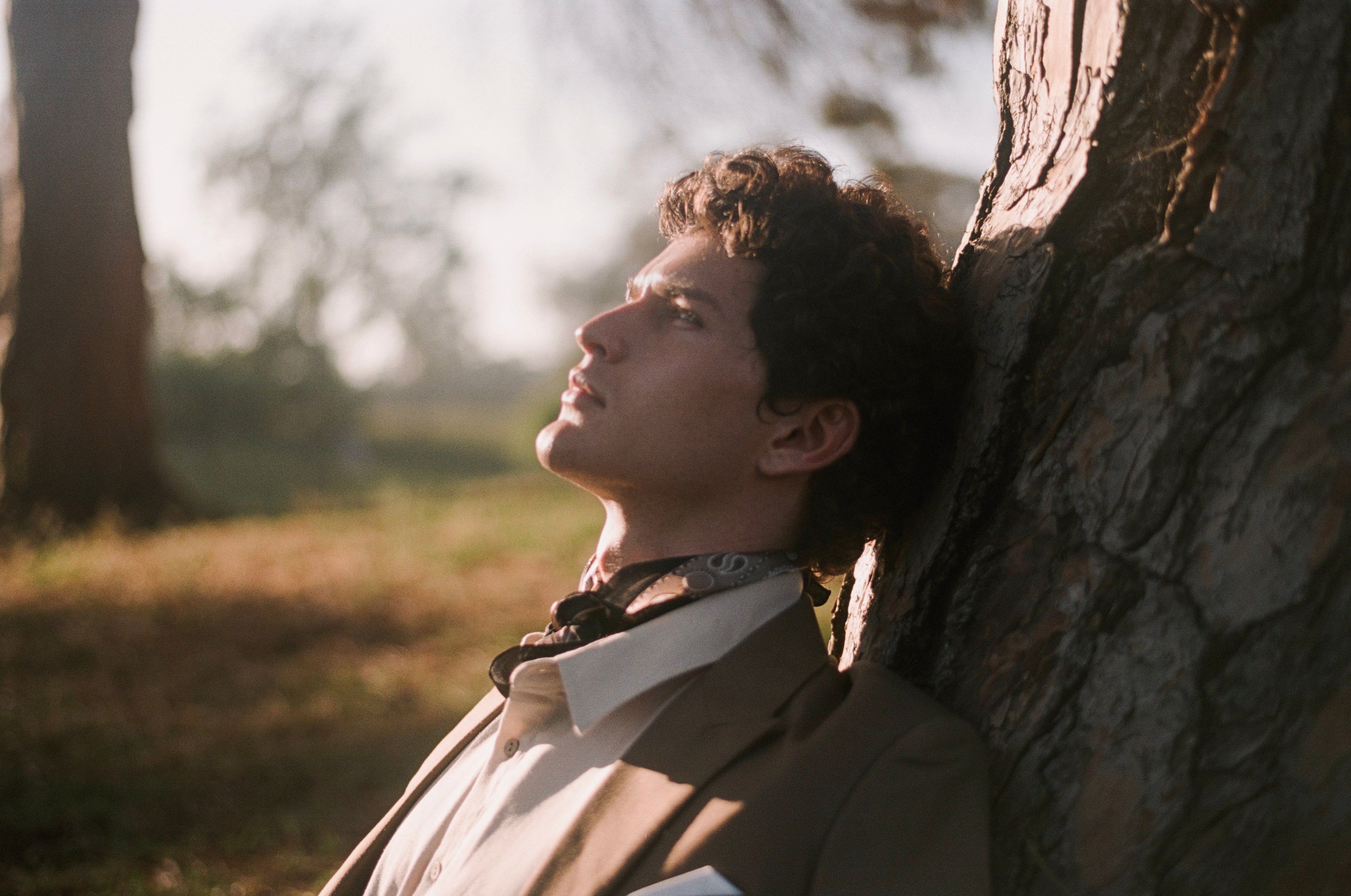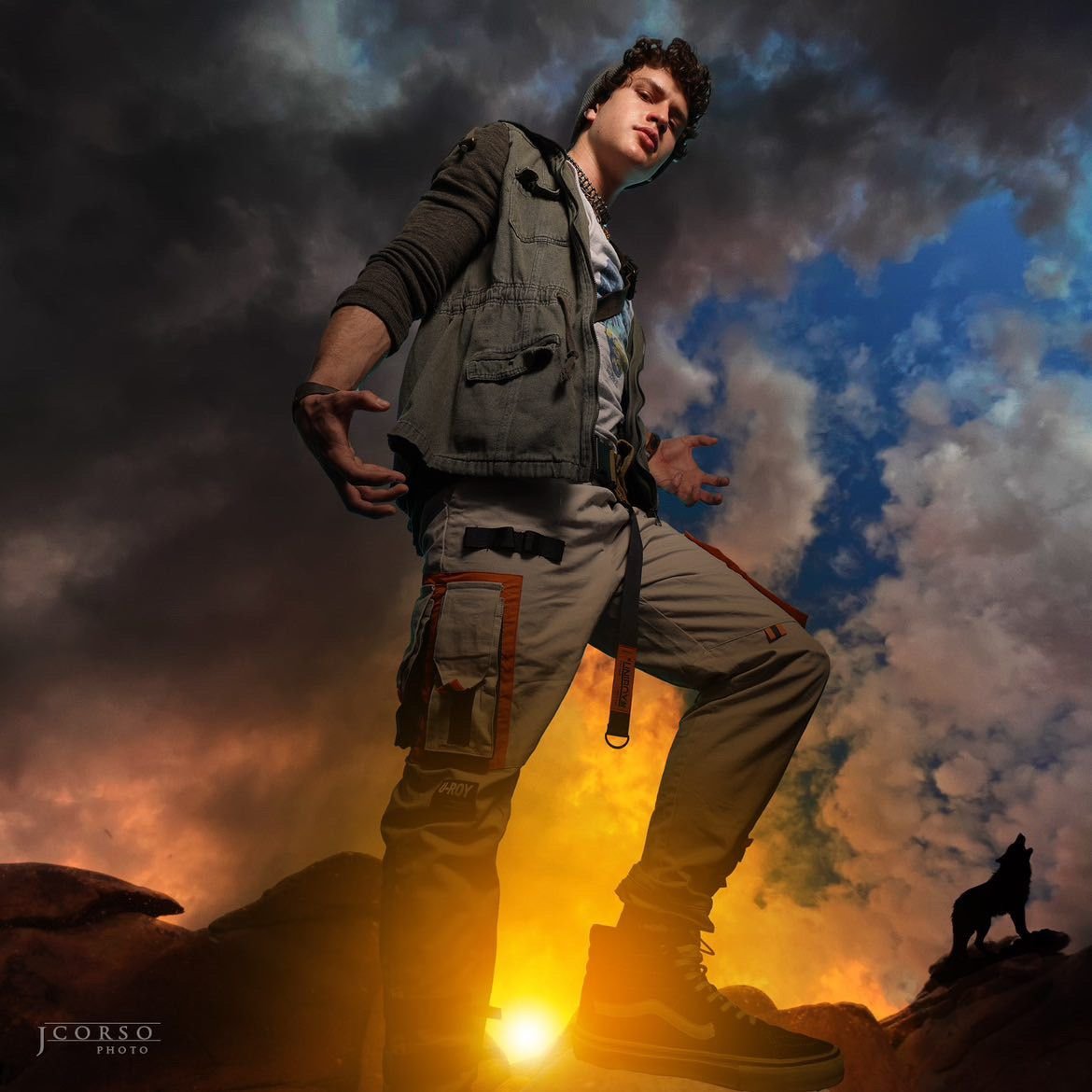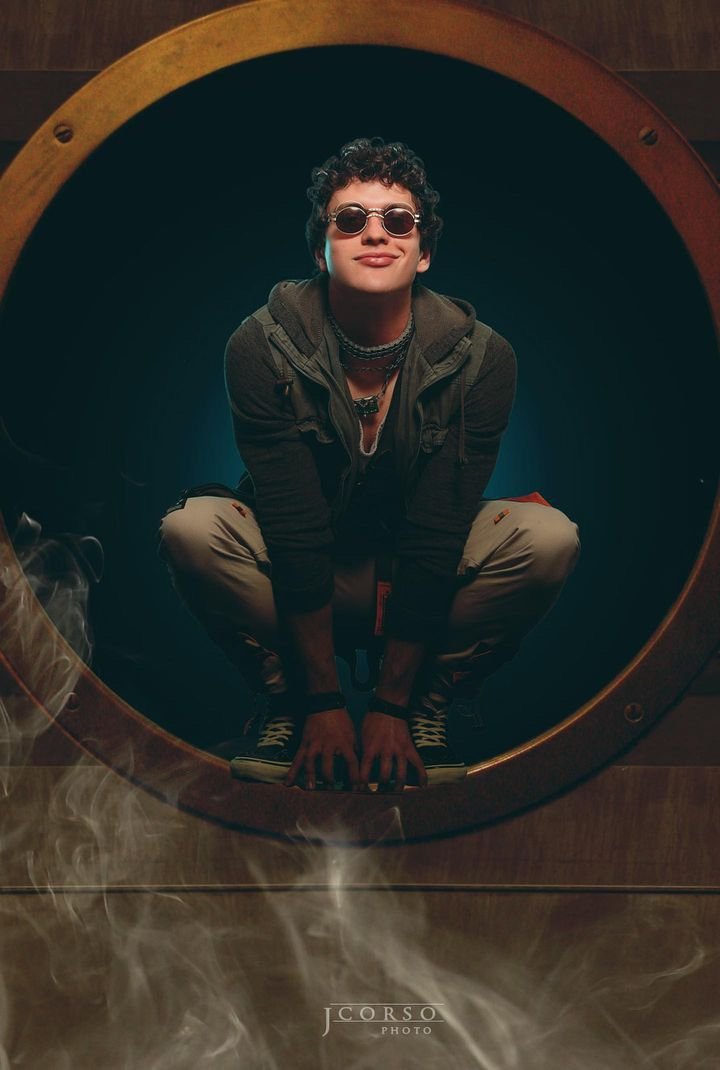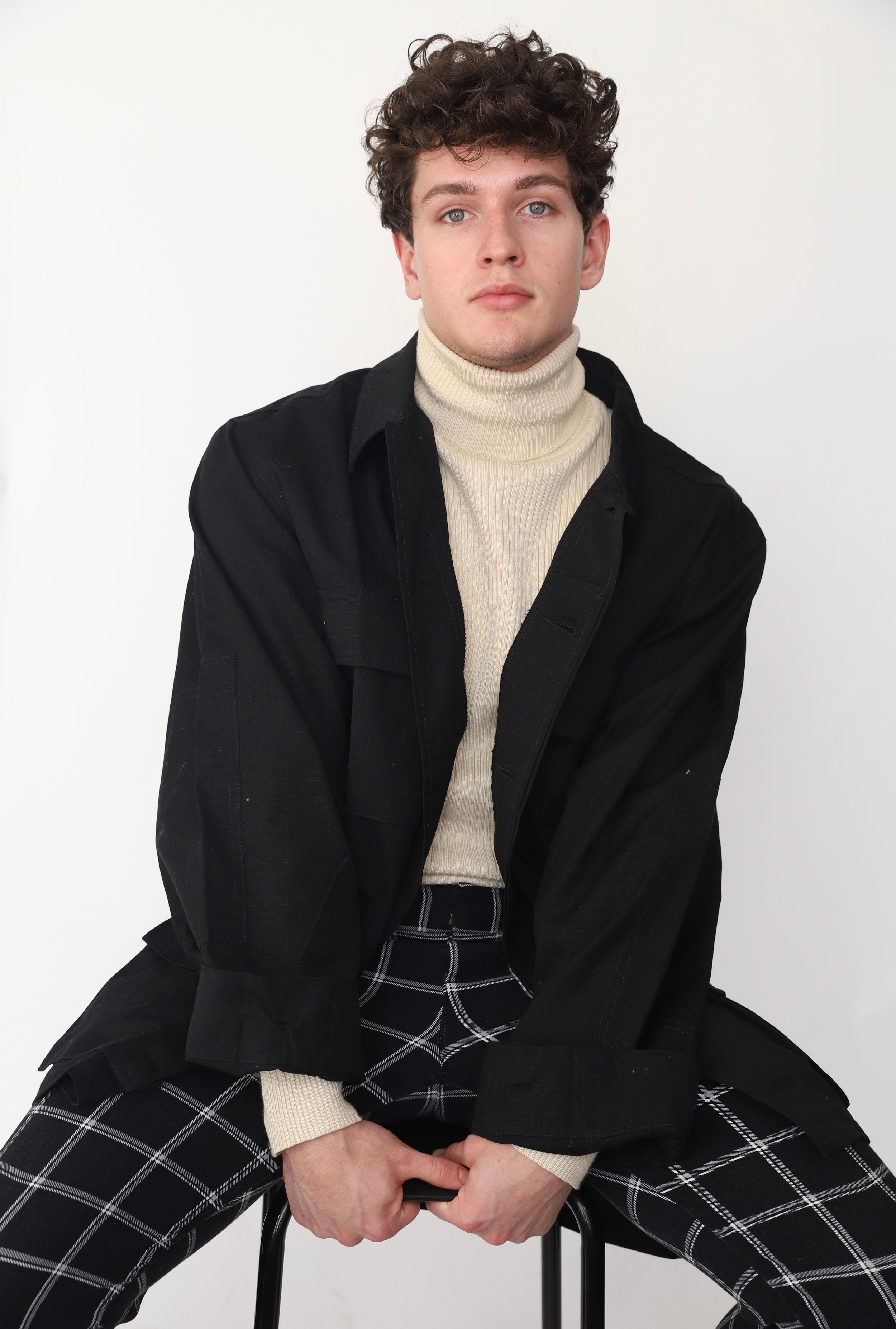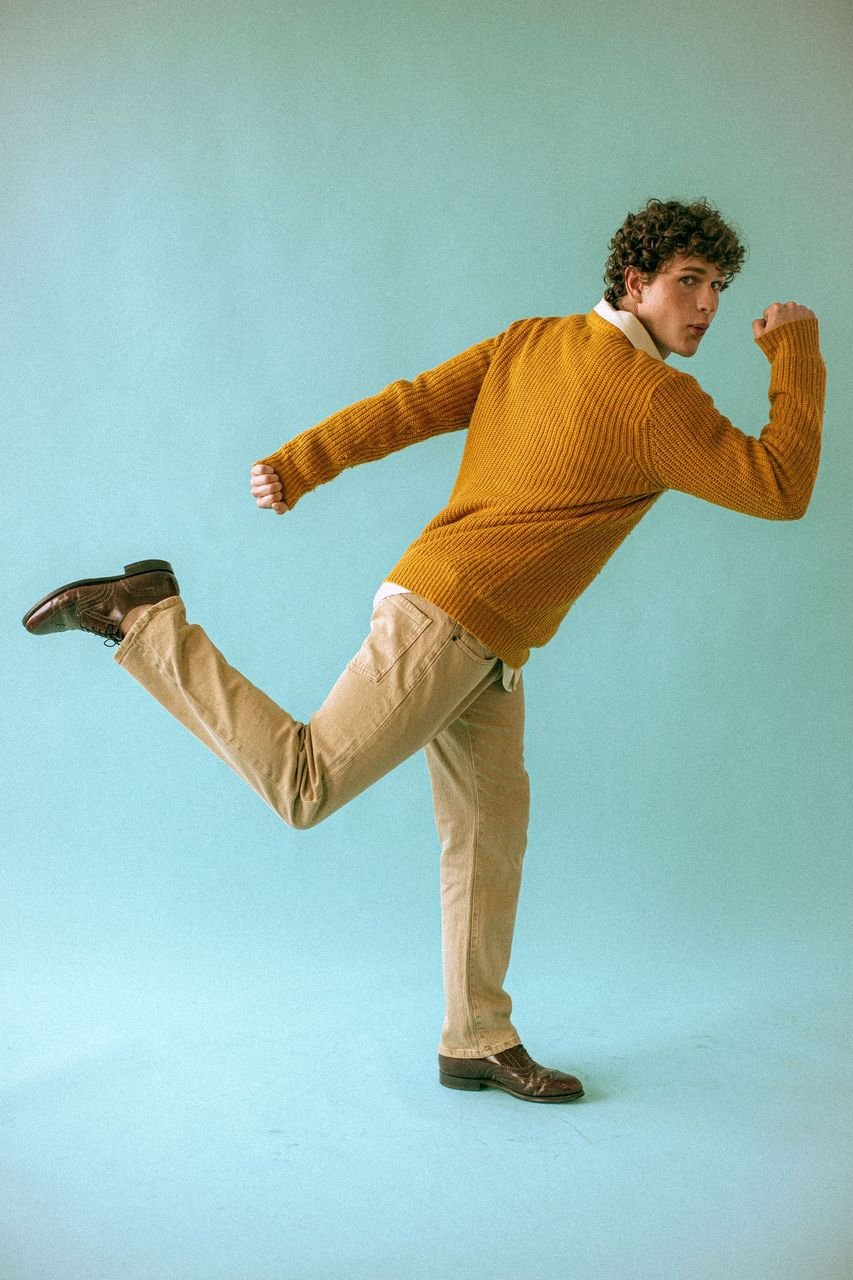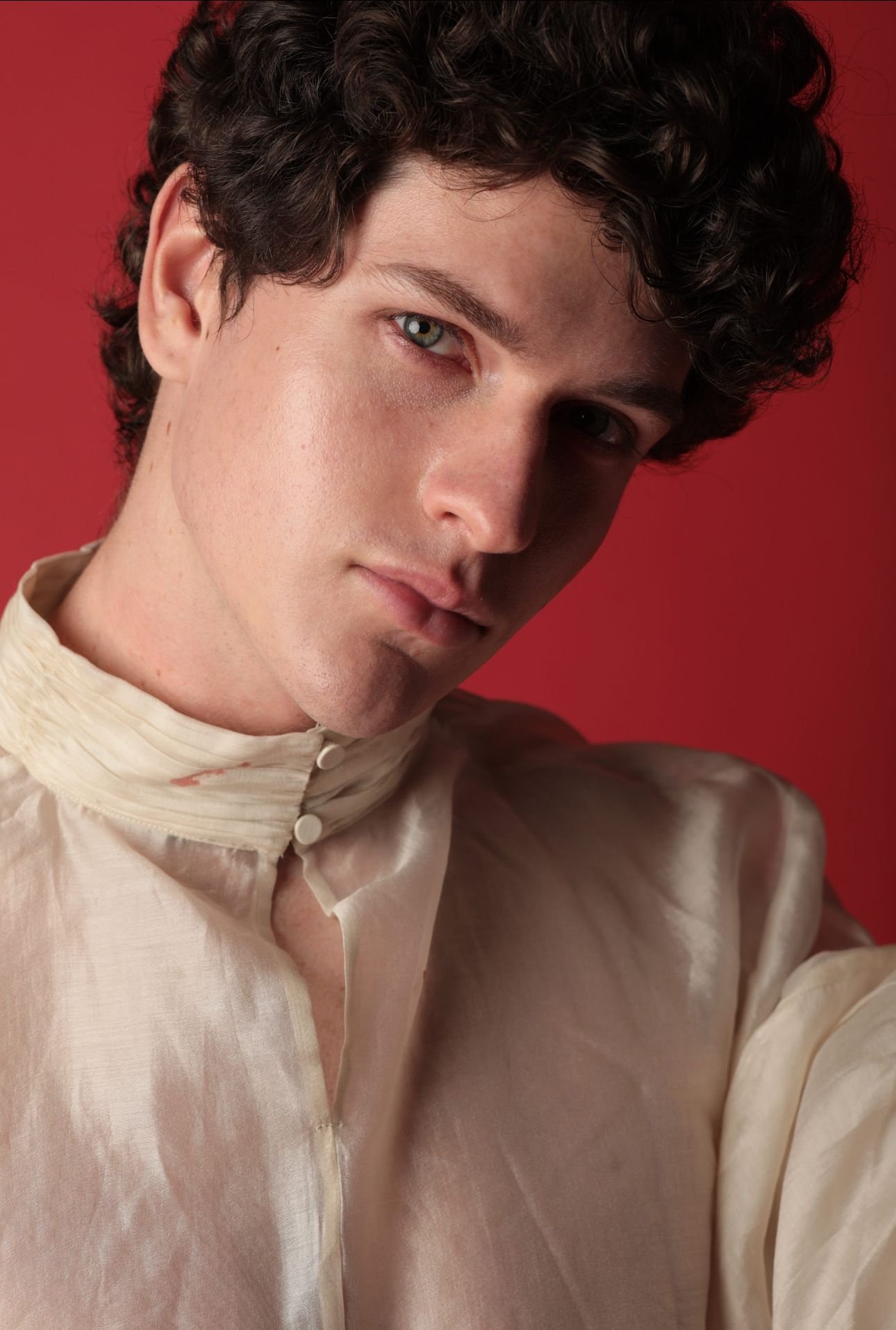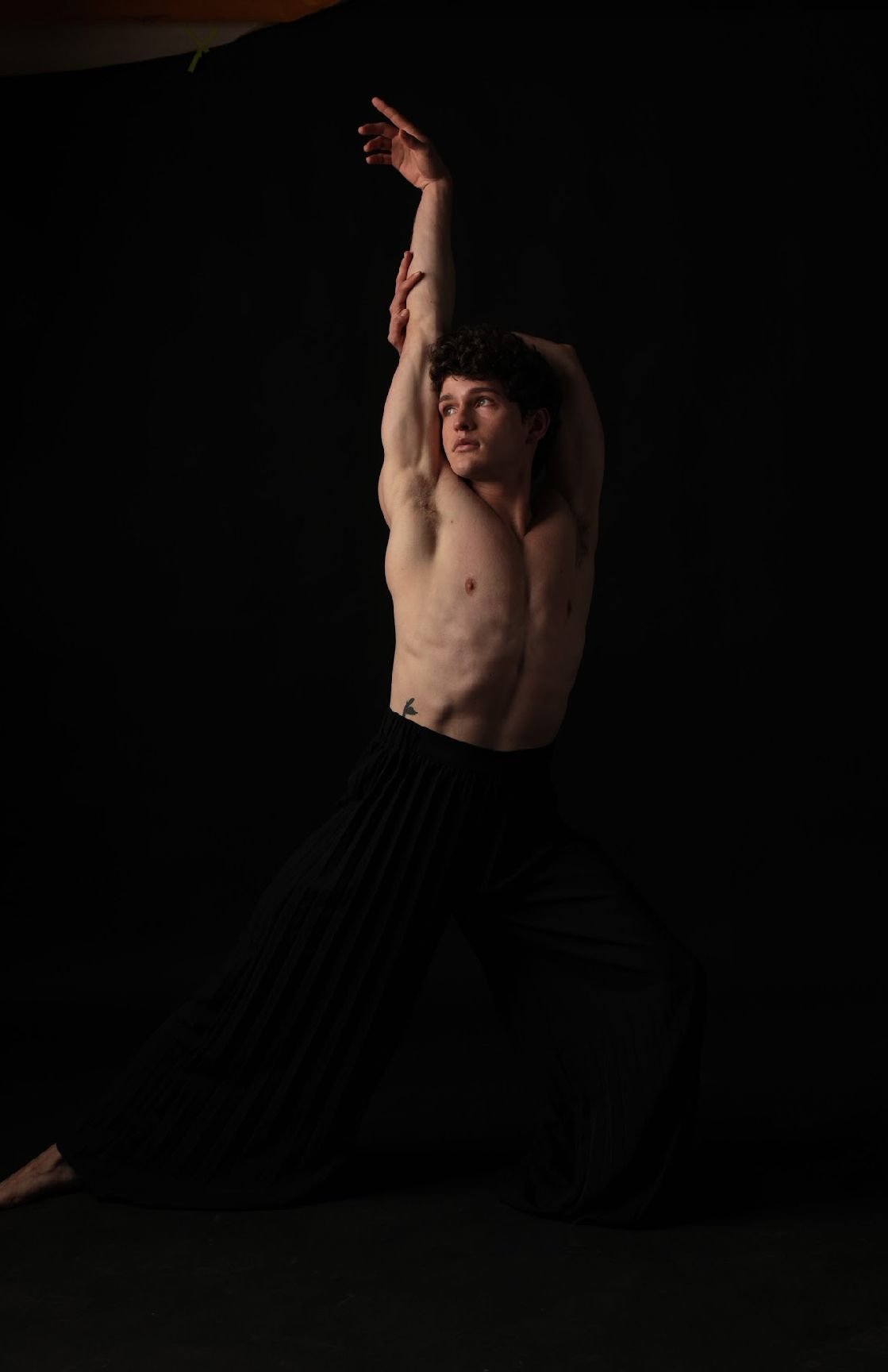Passion for performing
Caleb Lowell acts, models and dances. Photo by Jazeel Gayle
By Tom Victoria
Caleb Lowell is mired in a mystery. The actor portrayed Tyler in the Hulu series Saint X, a thriller involving the disappearance of a woman.
“My character meets this girl, Allison,” he said. “You end up finding out that she goes missing, and I'm one of the main suspects. We form a relationship over the course of the show. A lot of it is not sequential. It's flashbacks from the family's time at the island, as well as a current-day younger sister seeking answers of what actually happened to her older sister.”
The younger sibling plays detective to find the truth.
“The younger sister ends up forming a friendship with the man suspected of killing her sister,” Caleb said. “She's searching for answers, ends up finding my character, asks him about it. I was the last person to see her.”
He plays such a role so as to not tip off the audience about the character’s possible culpability.
“I mainly try to be in the moment and let the director give me notes to cater to the overall story,” Caleb said.
The cast filmed in the Caribbean.
“We worked on it for about five months in the Dominican,” Caleb said.
Photo by Andrew Prejam
He described the locale as breathtaking.
“It was interesting to become friends with the Dominican crew and get to know their world,” Caleb said. “A lot of privileges I enjoy in this country haven’t become available there yet.”
The 21-year-old actor, who is based in Los Angeles, explained the tale is not just a thriller.
“It's an interesting story,” Caleb said. “It's based off of a book. It's a commentary on privilege class. A lot of judgments that people place upon others simply because of the way that they appear. My character in particular is like a lot of young men, especially from East Coast families of privilege, who feel like they have to live up to their father's expectations. In this case, it's a father's expectation of becoming a man means you lose your virginity. The dad in the show is such a sleaze. The actor's a great guy. I love him to death. But the character of my dad is quite the scumbag.”
As with other performers on a program leading the viewers on a whodunit, he was subject to inquiries about the resolution.
“Me and a group of friends would have a watch party because Hulu releases their shows weekly and every week, we get together and watch it,” Caleb said. “And as we were going through the show, there was a tally of who did it, and everyone was voting on who did it. My name was pretty high on the list, but I didn't give anything away. I did have people DMing me on Instagram: ‘Did you actually do it?’ And I'm like, you'll have to wait and find out. Not giving it away. Plus, the script was written one way, but I didn't know how my character would be portrayed just because editing can change a lot of things. In the beginning, my character isn't even a suspect at all, but towards the end, there's, ooh, maybe something's going on here, because the pressure from the dad builds. He (Tyler) walks off into the darkness with the girl on this beach, and you're just like, oh, what happened?”
Photo by Rachel Lee
The young thespian is glad to be part of the series.
“It was a terrific project to work on,” Caleb said. “I definitely learned a lot as an artist, kind of being in the moment. It was something that I discovered there because I'd either been in theater or smaller indie projects. Hadn't really had the space or the caliber to really fill a character, be able to be with a character for five, six months. I got to know Tyler so well that by the end, I'd memorize my lines right before and just be able to go into the scene and completely embody that person, not be worried am I doing this right? Just because I knew who he was.”
He also credited fellow cast members for having a positive experience despite various challenges to complete the limited series.
“All of my scene partners were with terrific actors and actresses and definitely came back off that show inspired and kind of built up as an artist in a lot of ways,” Caleb said. “We were all living as a caste, a foreign country, and at a resort for on and off a good amount of time. We became somewhat of a family. We'd have family dinners at the resort there. Made lifelong friends. We all went through a lot. Our crew went on strike. There were accidents on the show. Not a very hard-working environment, but more difficult than it would be here. A lot of humidity, a lot of bugs, a different environment than it would be as if we were filming in L.A., which brought us really close together. I am super grateful for that. Above everything else, it was just a show. But what you take with you is the connections you make on set and the lessons you learn.”
Photo by Alexander Prejam
His passion for acting draws him to the camera and stage.
“I'm still discovering what it is,” Caleb said. “Olivia Colman said it best. She said you feel dangerously alive. They call action, and it's just you're so aware of everything and anything can happen. Anything's possible. I think for me personally, in my day-to-day life, sometimes I don't necessarily know what to say or how to act. But when you're given a script and when you're given exactly what's going on, you know what to do and you have freedom within that. Acting in the arts has just always been something that was a draw to me because I'm a student of humanity. I wonder often what it means to be alive, what we're all doing here.”
He explained acting leads an actor to learning about oneself.
“When you get to explore different characters, you learn to have different perspectives on life, which informs your own perspective,” Caleb said. “Not that it makes you any higher or any better than the other person, but for yourself, it makes you a more complete being. I think part of the journey as well is just allowing me to explore all aspects of myself. I've always had this question, up until recently of who am I? Because I know I could be all these things, but who am I? Personally as Caleb, and it's a daily discovery. But as you learn to play as other people and explore the psyche of another individual, it definitely does inform your own.”
Photo by Joseph Corso
He said a performer has the opportunity to make something out of any role.
“Any role has the potential to be great, no matter how visually small it may be,” Caleb said. “I feel like the best art is done for oneself, and so that doesn't matter. If you're a window dresser, make a backstory for the window dresser. Why is the window dresser working there? Why did they choose this? Is there something creative behind it? Are they headed to become a designer someday? I used to think in a vein similar to that, and then I just had this realization of there is no small role or large role, just as there is no small path in life or big path in life. We're all humanity, just pushing forward, being ourselves. And every character is beautiful and unique, just as every human is beautiful and unique.”
Some actors such as the legendary Steve McQueen were notorious for deviating from what’s intended for a scene, including upstaging other performers.
“I had forgotten that about Steve McQueen until just now, but I definitely remember watching The Magnificent Seven and learning about the little things, messing with his hat or different things,” Caleb said. “And I was like, oh, I need to do that. And so early on, I did a lot of theater. I would do that on stage and it would annoy the directors. One of the earliest things I did, and I was still a kid, we were in The Sound of Music, and I was just a chorus member, but I was in the big dance party. And so me and my dance partner choreographed the whole thing where we come across the stage, we do a twirl and we do a very big dip at the end. It got attention. People came up and said great dance. Loved you at the end of the show, but the director was like: ‘Stop drawing attention to yourself, you need to stop doing this.’”
Photo by Joseph Corso
He heeded the message.
“Just for me personally, I realized that it came from a place of ego, which I don't do anymore,” Caleb said. “I feel like for me, an interesting performance is one that feels real and truthful and honest. And when you are in that space, people are drawn to it because it's authentic as opposed to drawing attention to yourself simply for the sake of look at me.”
Sometimes, an actor can make a positive change to a scene, such as Vincent D’Onofrio accentuating the quirks of the eccentric Detective Robert Goren on Law and Order: Criminal Intent. D’Onofrio has spoken in interviews about how his character’s pauses annoyed directors, but found favor with producer Dick Wolf. Caleb does approach directors if he believes a scene may be improved with an alteration.
“I feel like the best projects that I've worked on have been a collaborative act between me and whoever is directing,” Caleb said. “The director kind of keeps the overall vision in mind, whereas the actor brings the characters alive from the script. If I do have a different idea or if I have an instinct that goes in a different direction, as long as it's not super off, I will say something.”
Photo by Jason Kramer
He’s been in professional productions for a few years.
“I started acting professionally about three years ago,” Caleb said. “I moved to L.A., started TV and film. Before that, it had just been small projects, indie films that I didn't get paid anything for, theater, the high school drama club, that type of thing.”
As a youth, he was drawn to the stage.
“I had friends who were actors, and there was just something so charismatic about them,” Caleb said. “They were well-versed. They had read all the classics. They had a gift with language, music, everything. I was like, where did that come from? The one common denominator that I found was that they were on stage. They were theater actors, very confident. Then I saw my first theater production, which is Beauty and the Beast, and I fell in love with every aspect of it. Acting is my main thing, but I dabble in a little bit of everything. It was just all of these art forms that I love and appreciate just coming together in one place, whether it was a set design of painters or the music writers, and it worked like clockwork. It was this beautiful, well-oiled machine that just brought something to life, and then it made you feel something. Especially just being a live performance, something intangible that just drew me to it. I wanted to do that. I want to make people feel the way that I'm feeling right now of excited and endless possibilities, and magic.”
Photo by Rachel Lee
As happens with many artists, he wasn’t from a place that supported that path.
“I was raised in a borderline culty environment, and so acting was very much discouraged,” Caleb said. “That's why it took me this long to kind of have that realized. I remember working my first day job, saying I was working at my job, but I was actually at the theater. I had to walk two or three miles to get there, would sneak into the theater, do my performance, come out, race back to my job, and then my mom or my dad would pick me up. They eventually found out and were very upset, but I made them realize that this was something I cared very much about and was willing to kind of do whatever it took to make it happen. I would sign up for the summer drama youth camp, forge my dad's signature and write a check from my own account because I had a job. They were kind of forced to let me go because they valued commitments and loyalty. So that's how the journey started with a lot of rough stops and starts and a lot of adversity along the way, but I wouldn't change it for anything.”
In his mid-teens, he began performing on stage and in amateur films.
“Just because the theater camp, a lot of people that did that also were part of this film club as well,” Caleb said. “Got to know them, and we filmed this really bad short film at a middle school over a weekend. I still look back at pictures of that and be like, oh my god, what were we doing?”
Photo by Justin Power
He is a native of the Lone Star State.
“We were positioned pretty much in between Austin and San Antonio, a very small town population, probably 10,000 or so, which was interesting,” Caleb said. “That's probably where my storytelling bent got started, just because I didn't see a lot of other people or we didn't have TV at home. So all of these stories that my friend talked about, whether it was Lord of the Rings or Avatar: The Last Airbender, I created in my backyard, my version of what I thought that would be, created gauntlets out of tin cans and swords out of my dad's woodshop and shields. And just kind of pretended what I imagined this to be, just to have the experience of what my friends had told me about. We lived on a relatively large property, so me and my younger sibling were able to pretend a lot, play a lot. That's where it all started. The stories and the imagination weren't fed to me on the screen, so I had to kind of produce it for myself.”
His family eventually came around.
“My family was very much against the idea of moving to California,” Caleb said. “But I got my first representation, and they were inviting me to come out and move to L.A. I was about to graduate high school. Covid was happening, so the world was a little chaotic. But my dad, it was so interesting, he kind of pulled me aside and he said, hey, look, if you don't go out there, you're going to regret it for the rest of your life, which was so like 180 of everything that they said. It felt so meant for me in that moment and just really inspired me to say, yeah, let's go for this.”
Photo by Jei Romanes
He has a process for learning lines.
“I have a photographic memory, so it's as if I was reading the script in my head,” Caleb said. “I've had to kind of fight against that just because it can often hinder a performance. Ten is a number that forms a synapse in your brain. If you do something 10 times, it kind of either forms a habit or forms a connection. And so I'll read the script 10 times through. This is actually a method I borrowed from, I believe, Colman Domingo. But you have the lines in your head and then you slowly kind of just begin to whisper them out as you repeat and repeat, and then slowly comes alive. You find little nuances here and there, and then you go to set and you forget everything you know and just play. It's weird how when it's ingrained in you and when you truly have it memorized, you don't even have to think about it. The lines just come. Memorizing the entire script is very important for me just because I'll know my cues. I'll know what the other person says.”
Some emotions can be harder to convey than others.
“Anger can be easily played at, can be easily acted, but to truly convey and experience anger for me is, I would say, one of the more difficult ones,” Caleb said. “In day-to-day life, it's very easy, especially living in L.A. and the traffic and the people, but I get on set and for some reason, that vulnerability is harder for me. Fear is also a harder one for me. I've never acted in a horror film, but in class or at an acting studio, just to actually experience fear. Just like every muscle in your body kind of vibrating and the synapses in your brain, short circuiting is a hard place to get to because it's one of the big things that our bodies and our brains protects us from, is feeling that. So to go there is somewhat difficult for me.”
Photo by Jei Romanes
Being an actor has led him to be more expressive in public.
“Part of the journey for me has been allowing my feelings, wherever it may be, simply for my work,” Caleb said. “I don't know if that's selfish, but if I feel upset, I'm learning to not shove that down to actually act on it, but not in a dangerous way. But for example, I was out with friends a weekend ago, and we were at a club, dancing, drinking, having a good time. And this random guy just starts filming one of my female friends. I got very upset about that. I wasn't going to do anything harmful, but I allowed myself to just go there. I guess it's the shining knight in armor me, just things like that. Or if I'm having a bad day, I will allow myself to cry in an airport. If I'm watching an emotional film, I'll allow myself to feel that emotion, whether it's in public or in private, because then it allows a greater level of vulnerability on set.”
He wouldn’t refuse the opportunities afforded by fame.
“It gives you a platform, it gives you a voice, which is something that I've always wanted long-term,” Caleb said. “I would love to direct, produce. I'm compiling projects as I go along of maybe this would be fun to do or writing a script here. Something that I was inspired to do by Val Kilmer. In the documentary Val, he talks about how he has storage units of binders of projects that never got made. But he had the idea, worked on it. I have binders of different projects of maybe this will be fun to do someday, but I definitely want to act as long as I possibly can. I'm working on music, painting, getting into fashion somewhat as well. I don't deny any creative urge within myself. And it can take multiple facets, go multiple places.”
Photo by Rachel Lee
Music is another passion.
“Music has always been a big interest for me,” Caleb said. “I started playing piano at the age of 6, 7. My older sister was a music teacher, so she taught me how to play, taught me how to sing. I'm working on an album I hope to release sometime this year. Music has always been a love language for me and something that I hold very delicately. I haven't put anything out just because I want it to be the best. I feel like music is a universal language that I want to treat with the uttermost respect, and it's something that I've always come back to. It's been with me very early on. I didn't feel confident enough to really do it again until recently.”
He also dances.
“I got into it with theater, with the summer acting camps,” Caleb said. “There was a course in dance, and when I moved out here to L.A., I began taking hip hop classes. Fell in love with it because I had mostly taken either contemporary or ballet, tap. It was a different way to kind of be in your body and move. I feel like I take a lot of my frustration out in dance. I'll just go to the gym and dance for an hour. It's so cathartic, and it's a great way to just release all types of pent up whatever that's in my body.”
The artist also works out.
“I love going to the gym,” Caleb said. “It’s a great place to de-stress. Usually go about five days a week combining yoga, cardio and weight training.”
Nature is a draw for his free time.
“I’m a huge fan of hiking and camping,” Caleb said.
Photo by Alexander Prejam
He draws upon creating art to stay motivated.
“I've never really had a problem with not being motivated,” Caleb said. “There are days I don't feel like getting out of bed. But what helps that then is just expressing the way that I feel in some type of art. It's been rainy a lot in L.A., and the paintings that I've been doing are very much like people crying in the rain. And just like that theme, I think discipline is very important, whether it's not forcing yourself, but doing something you don't necessarily feel like doing. I have a script right here that I'm kind of looking at to the side and I was working on before because it needs to get done. Deadlines really help me with motivation. Also, I try to watch at least one film every day, whether it's sections of it throughout the day or just at the end of the day watching a movie. That motivates me more than anything. These people worked on this, were able to do this. I could do that, too. There's a path to there. I need to stick to it and keep grinding, and eventually I'll get to this caliber, this level, if I just continue and keep pressing on.”
Photo by Alexander Prejam
He offered advice to aspiring actors.
“Don't quit,” Caleb said. “If it's your dream, go for it. Don't live anybody else's dream. Live your own dream. Protect yourself. Protect your soul, your mind. The arts have a way of pulling you apart if you allow them to. There's this idea that artists are either mentally ill or something along that vein. But I think being a healed person and being a whole person is important. And do it for yourself. Don't do it for anyone else. Don't go after the praise. If you're happy with it, that's all that matters. Don't overthink. That's a big one. I'm not going to say that I don't overthink every second of the day, but just find what you love. Find what you're passionate about. Go for it. Don't listen to anyone other than yourself. Yes, people can give you advice, people can nurture you, but at the end of the day, you know yourself better than anyone else, and you know what's meant for you. Don't give up. It may not happen today, it may not happen tomorrow, it may not happen ever. But you'll learn something in the journey now.”
Caleb’s Instagram: https://www.instagram.com/thecaleblowell/
Caleb’s International Movie Database listing: https://m.imdb.com/name/nm13263029/


